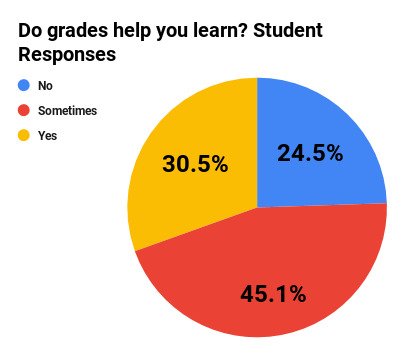Exploring different paths of education
The push to change the grading system or to completely abolish it is becoming increasingly more popular.
“I would like every class if it didn’t have a grade. It would be so nice if you could go to school and just learn and not have to worry about a 4.0,” said Fargo North junior Kim Kadrmas.
Grades are actually a fairly new method of teaching. They didn’t appear until 1792 when William Farish wanted to find a way to teach more students in less time. His solution was grades and the rest of the world quickly followed.
Stress is a major potential side effect of grades. “We’re just so fixated on the letter grade. Some of that is undue stress. Stress at the expense of learning something well is a problem,” said Emily Schneider, an English teacher at North.
Furthermore, 96.9% of Fargo North High’s students experience some sort of stress because of their grades and 48.4% experience high amounts. According to the National Institute of Mental Health, chronic stress can reduce the health of one’s immune, digestive, sleep, and reproductive systems. It can cause heart disease, high blood pressure, diabetes, and other illnesses. Stress can also cause headaches, sleeplessness, sadness, anger, and irritability. At its worst, it can lead to mental disorders such as depression or anxiety.
Grades can actually hinder learning.
“I think that in some ways it would be easier to teach if not for grades because students wouldn’t fear making a mistake. They wouldn’t fear failure. They would take the chance to learn it and to learn it well. With grades, it’s like the grade is the only thing that they see. The chance to fail isn’t something that kids feel like they have,” said Schneider.
Grades shift the focus away from learning towards getting the grade. Over 60% of Fargo North High’s students prioritize their grades over learning the material and over 100 students highly prioritize their grades over learning the material.
The enjoyment that can come with learning seems to be blocked due to grades. Almost 80% of students would enjoy school more if not for grades and over 130 students would greatly enjoy it more than they do now.
Many teachers are finding that grades don’t always correlate with their goals.
“My goal as a teacher is to teach content and attain proficiency for each student in that content, but also getting them ready for the real world… in our current grading system, at times kids get into the habit of chasing after points. In terms of actual academic achievement I don’t know if your grade always correlates with how much you know,” said North math teacher Keith Lehman.
There are other options for teaching that don’t include grades. North High School teacher Alexandra Kollman doesn’t use grades in her classroom. She uses standards references and ELOs to track her students’ progress. Through this switch, Kollman is noticing a difference. She says that her students aren’t stressed.
“It’s not about the grade it’s about what they know. ‘What do I need to do?’ is switching out into ‘What do I need to learn?’,” said Kollman.
She also finds that her students are more motivated to do well. If a student doesn’t perform well on an assessment, Kollman lets them retake it. They have to be “proficient” in a skill before they can move on. This method of teaching also lessens “point chasing” which is when students try to get as many points as possible rather than learning the material.
“I don’t think grades are necessary…Instead of getting a grade it’s now learning, and that’s what we’re supposed to be about is the learning,” said Kollman.
Many of the students enjoy Kollman’s way of teaching. In fact, an anonymous survey showed that 83.5% of the students enjoyed it. Rylie Burow said, “[I like that] you know how much you’re improving throughout the year,” and Abigail McKay said, “It shows what you need to work on and what you’re struggling with.”
However, not everyone is in favor of this system of teaching. Surprisingly, the anonymous survey showed a correlation between high grades and a dislike of the system. One student from the survey said, “I am not a big fan of standards referenced grading. I do not really like how in all of our classes you have to go beyond to get a 100%. It used to be that if you got everything right on the test you would be advanced.” Natalie Severson said, “I prefer the current system. With the ELOs it’s harder to get a higher grade because there are more expectations you have to meet to get each point level.”
Different methods of teaching are definitely interesting to consider, and it can be beneficial to compare the current way to other possible options. Perhaps more schools and teachers will look into changing the way information is taught in order to create a better learning environment for students.
Your donation will support the student journalists of Fargo North High School. Your contribution will allow us to resume physical printing of our newspaper for students at Fargo North!

Laura Simmons is a writer for Fargo North High's Scroll. She takes Orchestra and Latin as well as Journalism for her electives. She is also active in multiple...



